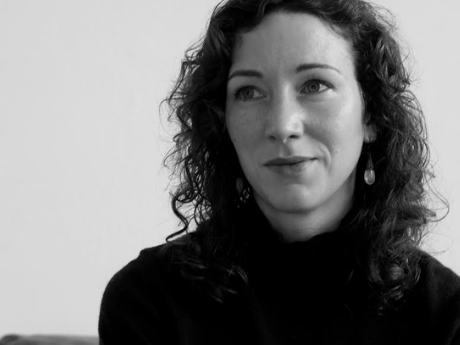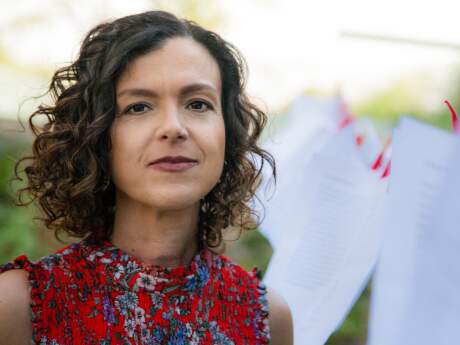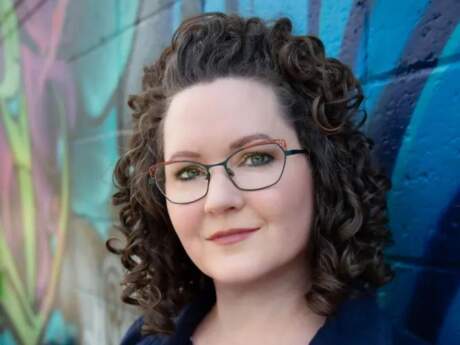In Their Own Words
Lightsey Darst's “Paradise”

Paradise
There: between sea and land, four hold a fifth among them—moonlit, flashing shadow.
How do they move—toward earth or ocean? Must be a rescue—he touched a depth
empty of air, a pure blue fear, but strong hands saved him & brace him while the sea
releases, breath returning to each niche of his lungs—that's the shaking you see. Or is it
ecstasy—almost free, now he writhes while the others struggle to bind these lashing octopi
in the shape of a man, hoping to make him speak, be their brother again. Or do you witness
(silently, voiceless) a drowning: like pallbearers they hold him level, face to the moon,
showing him for a last gasp the mortal view that he, innocent or guilty, knows no
ultimate word can save, the wave in their eyes surviving him—and does he cry out,
flying close to his horizon, or treasure what will inundate him limb by limb as its cool verge
forever stirs toward an end he clearly sees, but you don't see it, only this scene you scan
eagerly as Daddy drives by, drives home, the road drones but a glimpse is enough to seed
riddles in a hundred years of dreams (you live that long), codes of all slipping loose, dull
iris blossoms again ink-blue, no one can have your life back from the foam, or will he
never remember this—moment half-free half-forced, branches of his mind, roots of his
groundless nerves filling with liquid will while the exorcism plies above him, burns above us.
His job: magician
In some area of your life, you are just arriving.
On "Paradise"
It's a strange thing to look back at DANCE. I have to do this reconstruction, this remembering—which I, personally, have always found difficult. I am not good at remembering why I did what I did or how it felt to me. How could I be? I'm a different person.
There's also the fact that the book is more complex than I am. How can a book be more complex than a person?Whereas my complexity is spread out in time, the book's complexity is simultaneously available. If I'm a city, complex because I'm alive and changing, the book is an archaeological dig in which all layers are available at once.
With that caveat, this poem, "Paradise," is one of DANCE's double acrostics (the tell for that is the word "octopi"). A double acrostic turns out to be very confusing to write. First, you need content—a story, an arsenal of language. Then you come up with a symmetrical phrase or pair of phrases, preferably one without too many difficult letters. Then you fill the thing in like a crossword puzzle.
This seems like a completely wrong way to write a poem, doesn't it? A poem is supposed to spring from a holistic inspiration, from an overwhelming feeling (recollected in tranquility, etc). Or perhaps it comes to life the way an essay does, by trial and error. But this kind of engineering, this allowance of determinism—it's philosophically questionable.
In fact the whole book is questionable. I try to remind myself I did this deliberately. I thought the turn of my third decade—when I didn't have children or a career I cared about or a big love—was a perfect time to write an epic. That is, a perfect time to make a big mistake. An epic is a mistake. Impossible for it to be otherwise. Or so I tell myself.
But perhaps a book always feels like a mistake. I'm having a child in a few months, so I have new ground for that common comparison of book to baby, writing to gestation. Yes, there are some similarities. But the book is finished. It comes out, it's solid, it's expelled from the mind—unlike the child, who comes out needy, vulnerable. About the book, what can one say? It lives in the world. It's too late to remedy it. The child, on the other hand, will live with me.
Anyway, back to this poem, "Paradise." This quickly-glimpsed person who may be being drowned and may be being rescued—he is the beginning of some fundamental mystery for the witness, who will go on wondering about the edge between ecstasy and suffering, wondering to what extent it is possible for anyone to know what anyone else feels, for the rest of his or her life.
Why the double acrostic? I was obsessed with secret meanings—with astrology, biblical fundamentalism, tarot, kabbalah. I was obsessed with the idea of reading for personal meaning—not the detached reading one learns to practice as a good student, but ransacking the text, hunting for one's own life. I wanted to offer rewards to that kind of reading. So the double acrostic is only one of the "Easter eggs" in DANCE.
It's not that I believe the universe works this way—signs, fate, hidden meanings. In fact I reject that view of the universe. But when I looked into such views more closely, I felt tremendously moved by their search for meaning. And I also felt I had to go deeply into this view to really reject it.
Or, to put it another way, I had to think deeply about my marriage in order to choose divorce. And that's what I eventually did, Reader: I divorced him.
So is the man in the poem being drowned or saved? There is no way to know.
I will probably never write like this again.


